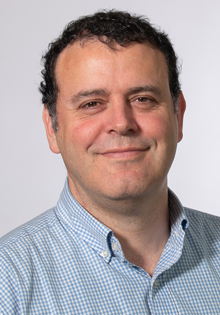NIH administers first clinical trial treatment for GM1 gangliosidosis, a lysosomal storage disorder
Milestone marks the first patient with GM1 gangliosidosis treated with gene therapy
Date Posted: May 23, 2019 |
|
| Heather Gray Edwards, PhD, DVM | |
 |
|
| Miguel Sena-Esteves, PhD |
The first clinical trial of a gene therapy treatment based on discoveries made by UMass Chan Medical School and Auburn University researchers has been administered in a child at the National Institutes of Health. The treatment took place in May.
The clinical trial is a significant milestone for GM1 gangliosidosis, a deadly disease with no approved treatment.
GM1 gangliosidosis is a rare and fatal neurodegenerative genetic disorder caused by impaired β-galactosidase (β-gal). Defects in this gene cause impaired enzyme activity leading to the toxic accumulation of gangliosides and neurodegeneration that presents as cognitive impairment, paralysis and early death.
Miguel Sena-Esteves, PhD, associate professor of neurology at UMass Chan Medical School; Heather Gray-Edwards, PhD, DVM, assistant professor of radiology at UMass Chan Medical School; and Douglas Martin, PhD, professor of anatomy, physiology and pharmacology at the Auburn University College of Veterinary Medicine, have worked collaboratively for nearly 15 years, combining small and large animal studies to cure rare diseases.
Research into potential therapies for lysosomal storage diseases such as Tay-Sachs, Sandhoff disease and GM1 gangliosidosis at UMass Chan Medical School has already led to significant advances in the field, including research and development of the gene therapy vector used to deliver functioning copies of the defective genes that cause disease.
Axovant Sciences, a Swiss company developing innovative gene therapies for serious neurological diseases, licensed exclusive worldwide rights from UMass Chan Medical School for the development and commercialization of gene therapy programs for GM1 gangliosidosis, Tay-Sachs and Sandhoff diseases in December 2018.
The first patient received the treatment of AXO-AAV-GM1 (also known as AAV9-GLB1), an investigational gene therapy for the treatment of GM1 gangliosidosis at the NIH by Cynthia Tifft, MD, deputy clinical director at the National Human Genome Research Institute and a leading expert in ganglioside storage disorders.
The 10-year-old patient has experienced no complications related to the administration of the therapy and continues to be followed by physicians. The NIH has received approval to treat additional children in the context of a phase I/II clinical trial; more information can be found online.
“GM1 gangliosidosis is a devastating disease in young children, for which there are currently no approved treatment options. The development of a safe and effective gene therapy for these patients would be a welcome advancement in the field of pediatric lysosomal storage disorders affecting the brain,” Dr. Tifft said.
“Treating the first GM1 patient with gene therapy is a huge milestone resulting from a long collaboration between Auburn, NIH and UMass Medical School,” Dr. Martin said. “Seeing all of the effort come together to help patients who have no treatment options today gives me a lot of hope.”
Related story on UMassMedNow:
UMMS licenses clinical-stage gene therapies for Tay-Sachs, similar diseases to Axovant